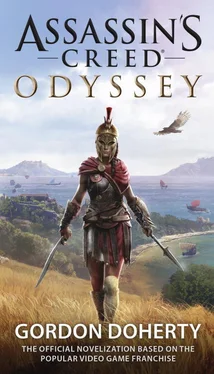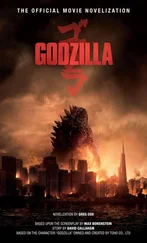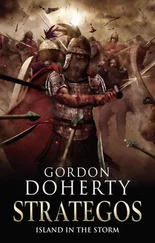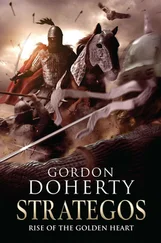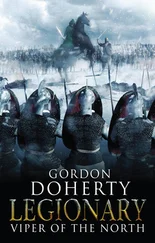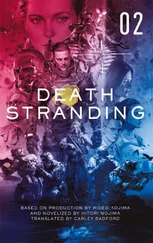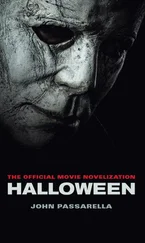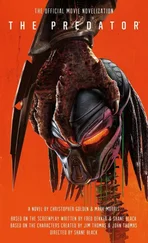They shared a look then—just like that moment of their shared childhood, when Kassandra had nearly caught him. A fresh tear spilled down Alexios’s cheek, mixing with the rain. “I cannot be what you want me to be.” His head shook slowly, his lips trembling. “The weeds burrow too deep.”
She saw his hand move toward the edge of his greave, saw him draw the hidden knife from there, saw him strike toward Myrrine’s neck. Time slowed. Kassandra felt her body spasm, as she drove the Leonidas spear deep into Alexios’s chest. The knife toppled from his grip, and then he stared into the sky with a long, slow, final breath.
Myrrine let out a plaintive wail, and Kassandra sobbed long and loud. The thunder rolled overhead, and only as it faded did Myrrine’s weeping fall silent.
“I tried to save him, Mother,” Kassandra croaked as the rain began to ease.
“I saw what happened,” Myrrine whimpered. “He is free now.”
They embraced each other and Alexios’s body for hours. Eventually, the clouds parted and shafts of deep orange light stretched across the heights of Mount Taygetos.
I walked through the darkness, and I was not afraid. I was a Spartan, a misthios, a war hero. My footsteps sounded so lonely in that dark old place. As I went deeper underground, the summer heat behind me faded. I struck a flint hook to light my torch, and passed the now-empty rock-cut chambers. The chains were still there, and the long-dried bloodstains of the Monger’s victims. I passed the forgotten hall with the grim snake statue. The trough below its fangs had long run dry of blood, and so the snake would starve. The altar where I had first met that twisted soul, Chrysis, now languished under a thick coating of dust. On I went.
Part of me dreamed, like a child, that I might find my brother deep in these old caves, just as I had found him that night when the Cult had gathered here. But the memory of splitting his heart with my spear was still too close and raw. It had been almost a year since his death. We buried him and we wept. None had expected any others to attend the ceremony, but when Nikolaos and Stentor appeared to watch from afar, I gave them both a solemn look, inviting them to come closer. That night, we dined in the old family estate. It was desperately awkward at times. When Nikolaos, at one end of the table, asked for a cup of wine, Mother, at the other end, poured one… then drained it in one gulp herself, before carrying on eating. Stentor chuckled in amusement, before disguising it with a cough. Aye, those wounds did not heal with that feast, and they most probably never will. But there was an understanding now—the hatred of the past was buried, the Cult with it.
It was with Mother’s blessing that I set out once more the following spring, on one last voyage that I knew I could not avoid. As the Adrestia cut across the seas, Barnabas and Herodotos were inseparable, recounting the tales of our adventures together, the captain acting out and wildly exaggerating events on the deck, while Herodotos tapped away with his stylus at woodpecker-like speed to record it all, tongue poking out in concentration.
We came to the broken island of Thera on a serene day—the sea like a teal silk, not a breath of wind in the air. Herodotos offered to accompany me into the black mountains. But I declined. This was a journey that I had to make alone—well, with Ikaros on my shoulder. I walked around that crescent, barren husk of rock—long ago blown apart by a volcano—wondering if Meliton’s claims of elaborate carvings high up on the rocks had all been a hoax, a wild jest. What was there on this forsaken isle but ash and stone?
I trekked into the heights. I spent days searching the rugged land. One day, I came to a sheer wall of rock—blank to the eye. It was only when I slid my hand along the surface for balance that I felt the fine etchings. Now when I stood back I saw the strange inscriptions—betrayed by the merest hint of shadow. I stayed there for days, exploring, reading the symbols again and again, watching them at night in the hope they might light up as they had done for Meliton. One night they did, and a section of rock peeled back to reveal a hidden gateway into the mountain. I stepped inside, and that was where I found him. My real father.
The legend, Pythagoras.
Alive some sixty years after most thought him dead—many, many more years older than men should live. His eyes were bright, his mind golden. His words changed everything. He showed me things that I knew I could never explain to another soul… except maybe Barnabas. The island of Thera was a smashed husk, yes, but beyond that rocky gateway, golden wonders lay. The strange carvings were only the beginning of it. He gave me an ancient staff—a fine piece that felt strange to the touch just like my spear—and showed me many other such marvels. Yet as if tragedy had shadowed me here, I spent only a few days in his company. The brightness in Pythagoras’s eyes began to wane, his gait became shambling and his breaths shallow. He explained it was because this was meant to be, that the staff had granted him his extra years and now I was to be its bearer. It was on the third day that I awoke to hear him wheezing, saw his lips had turned blue. I tried to help him, to give him back the staff, yet he refused and insisted it was his time. He died in my arms, just like Alexios.
I burned his body on a pyre as he insisted I must, and watched the smoke carry his shade away. After that I chiseled at the stone around the hidden gateway, causing the cliff to slip and bury the entrance forever. Again, Father had insisted on this, and I knew why. For those few days inside that place had shown me that all in this world was truly not as it seemed—just as Sokrates had insisted. Yet there were still so many secrets, so many questions unanswered. With his dying breaths he had told me that we would speak again. And that was why I knew I had to come back to the Cave of Gaia.
My footsteps echoed like the flapping wings of disturbed doves as I entered the great cave, and set eyes upon the circle of polished stone, and the red-veined plinth in the center. No Cultists, no Deimos… no Alexios. My throat thickened, achingly sad for all that I had lost. Then I set my eyes on the dust-coated pyramid atop the plinth and felt my heart begin to soar.
I stepped forward, sucked in a lungful of air and blew the dust from the pyramid. Its golden luster returned, and I felt that low hum strike through the cave, saw the strange glow from within the piece.
And then it spoke to me.
“Come closer,” it whispered.
My heart froze. The voice… it was Mother’s voice. That was one secret Father had explained to me: “The artifacts of the ones who came before are enchanting… but devious. They search within you, they know what you are, what you love, what you fear. They twist your heart, shape your soul, fog your mind. Be careful, Kassandra.”
I reached up, my hand hovering over the pyramid, feeling the heat emanating from it.
“Touch me,” it begged.
I wet my lips, spread my feet as if about to go into battle, then placed my palm upon the smooth surface. It was as if I had been struck on the head with a boulder. White lights, golden flashes, an aria of shrill song. Something seized me, shook me, wrung me. It was like great hands pinning me, then hammering at my spirit as a smith might try to shape a blade. This unseen force was trying to steal from me my very essence… or to slay me. I felt a scream rise in my chest.
Then a force like a stiff gale hit me, and the wicked energy was gone. I felt safe now, in this strange netherworld of soft light, where I had neither weight nor form. Now I heard another voice.
Читать дальше
